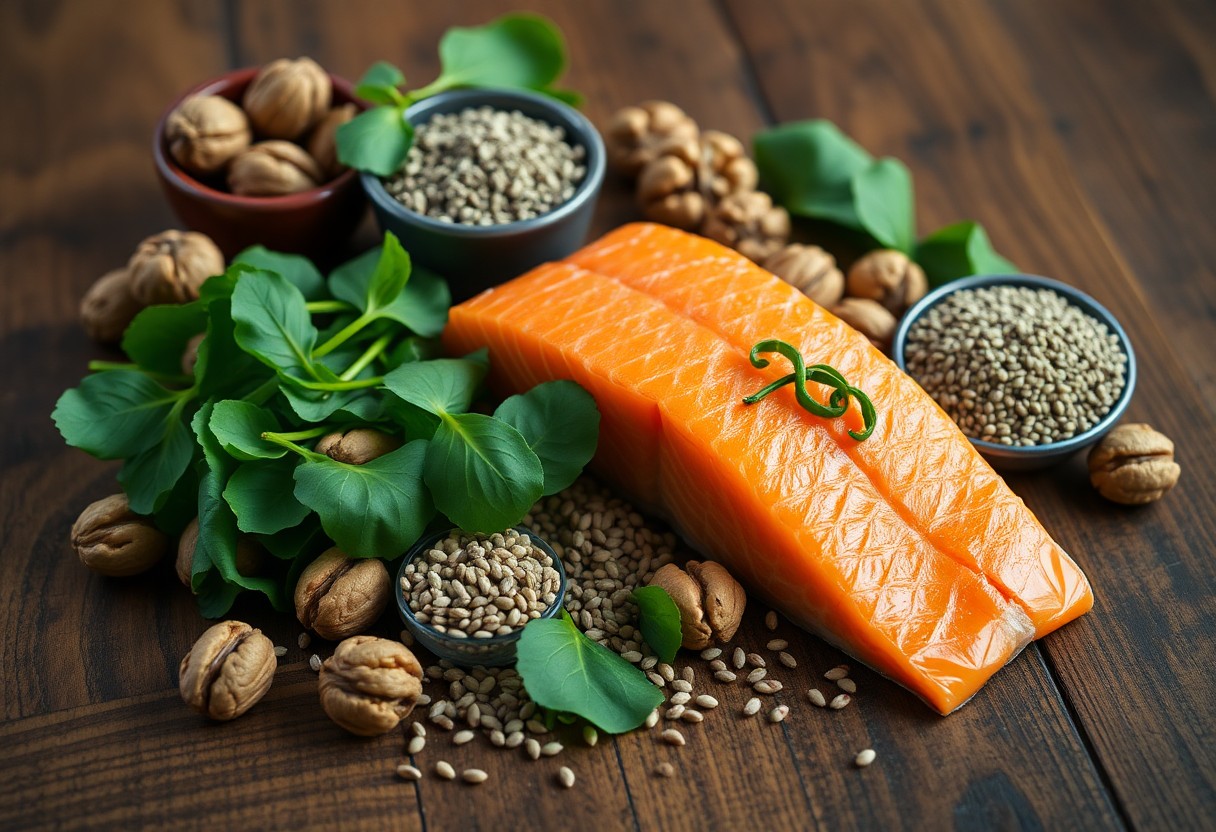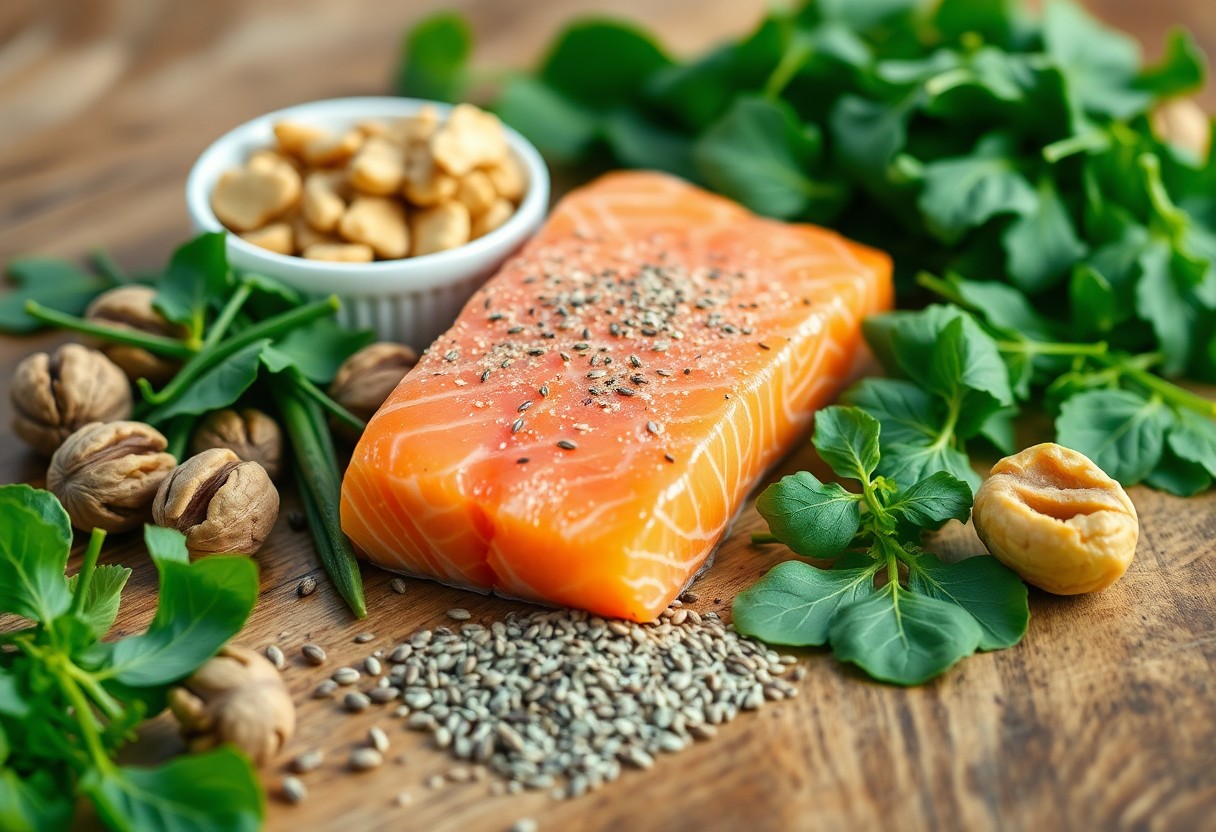It's vital for you to understand the role of omega-3 fatty acids in promoting brain health. These vital fats are linked to improved cognitive function, better memory, and even mood regulation. By incorporating foods rich in omega-3s into your diet, you can support your overall brain health and enhance your mental clarity. In this blog post, you will discover the best sources of omega-3 fatty acids, making it easier for you to make informed choices that benefit your mind and body.
Importance of Omega-3 Fatty Acids
Before exploring into foods rich in omega-3 fatty acids, it's imperative to understand their significance for your overall health. These beneficial fats play a pivotal role in various bodily functions, particularly for your brain. They support cognitive function, memory, and emotional balance, making it vital to include them in your diet for optimal brain health.
Brain Function and Development
Above all, omega-3 fatty acids are instrumental in brain function and development. They contribute to the structure of your brain cells, ensuring efficient communication between neurons. This is especially important during critical growth phases in childhood and adolescence, where proper brain development is linked directly to cognitive performance and emotional regulation.
Benefits for Mental Health
An increasing body of research suggests that omega-3 fatty acids can have a significant impact on mental health. Regular intake is associated with reduced feelings of anxiety and depression. These fats act by modulating neurotransmitter pathways and inflammatory processes, leading to improved mood stability and cognitive clarity.
It’s imperative to consider how incorporating omega-3s into your daily diet can enhance your mental wellbeing. Not only do they support emotional resilience, but they also help in reducing symptoms of various mental health disorders. For example, individuals consuming adequate amounts of omega-3s have reported lower levels of anxiety and depressive symptoms. This makes omega-3 fatty acids an important component of a balanced diet that prioritizes your mental health.
Types of Omega-3 Fatty Acids
You may be surprised to learn that there are three primary types of omega-3 fatty acids, each with unique benefits for your brain health. Below is a quick overview of these crucial fats:
| Type | Source |
|---|---|
| ALA (Alpha-Linolenic Acid) | Plant-based sources like flaxseeds, chia seeds, and walnuts |
| EPA (Eicosapentaenoic Acid) | Fish and algae |
| DHA (Docosahexaenoic Acid) | Cold-water fatty fish and some algae |
| Health Benefits | Support cognitive function and reduce inflammation |
| Recommended Intake | Varies by individual, generally 250-500 mg combined EPA/DHA daily |
Any inclusion of these types in your diet can greatly enhance your brain health.
ALA (Alpha-Linolenic Acid)
Across various plant sources, ALA stands out as a vital omega-3 fatty acid. Found predominantly in flaxseeds, chia seeds, and walnuts, ALA is pivotal for those following a vegetarian or vegan diet. Your body can partially convert ALA into EPA and DHA, although this process is limited. By incorporating ALA-rich foods into your meals, you can begin nourishing your brain and supporting cognitive function.
EPA (Eicosapentaenoic Acid) and DHA (Docosahexaenoic Acid)
Acid-rich EPA and DHA are predominantly found in fish and are crucial for optimum brain health. These omega-3 fatty acids serve important roles in reducing inflammation and supporting cellular function in the brain. They can be particularly beneficial for those looking to enhance cognitive ability or protect against neurodegenerative diseases.
Acids like EPA and DHA are particularly effective in promoting brain health due to their anti-inflammatory properties and positive effects on mood. These omega-3s help to maintain the structural integrity of neurons, contributing to improved memory and cognitive function. Furthermore, they play a role in neurogenesis, the process of creating new neurons, which is vital for learning and memory retention. Including sources of EPA and DHA in your diet can significantly support your mental well-being.
Best Food Sources of Omega-3 Fatty Acids
All of your brain health efforts can be enhanced by incorporating a variety of foods rich in omega-3 fatty acids. These vital nutrients are particularly abundant in certain fatty fish and plant-based options that can easily fit into your diet. By choosing the right sources of omega-3s, you can support cognitive function and overall wellness effectively.
Fatty Fish
Fatty fish, such as salmon, mackerel, sardines, and trout, are among the best sources of omega-3 fatty acids. Packed with EPA and DHA, these fish can significantly contribute to your brain health. Including them in your diet at least twice a week can help you obtain the necessary nutrients to support cognitive function and reduce inflammation.
Plant-Based Options
Along with fatty fish, there are numerous plant-based options available rich in omega-3s, such as flaxseeds, chia seeds, and walnuts. These sources are especially beneficial for those who follow a vegetarian or vegan lifestyle, providing ALA, another type of omega-3 fatty acid. Incorporating these foods into your diet can help you achieve a balance of omega-3s while also gaining additional health benefits.
And while ALA is not directly converted to EPA and DHA in the body, it still plays a vital role in your diet. Ground flaxseeds can be added to smoothies, oatmeal, or baked goods, while chia seeds make a great addition to yogurt or salads. Remember to experiment with different plant-based sources to find what you enjoy the most; this variety will keep your meals interesting and nutritious.

Recommended Daily Intake
Now that you understand the importance of omega-3 fatty acids for brain health, it's crucial to know the recommended daily intake. For most adults, aiming for 250-500 mg of combined EPA and DHA daily is beneficial, while pregnant or breastfeeding women should target at least 200-300 mg to support fetal and infant brain development.
General Guidelines
Daily consumption of omega-3 rich foods can greatly enhance your brain health. The American Heart Association recommends that you include fatty fish in your diet at least twice a week, alongside plant-based sources of omega-3s like flaxseeds and walnuts to meet your daily intake goals.
Special Considerations for Different Age Groups
Different age groups have varying omega-3 needs. Children require adequate amounts for cognitive development, while older adults benefit from higher intakes to support brain function and reduce disease risk.
Plus, it's vital to adapt your omega-3 intake based on your life stage. For example, children aged 1-3 years should aim for around 0.5 grams per day, while adolescents might need upwards of 1 gram to support their growing brains. Older adults may require 1-2 grams daily, as dietary absorption can decline with age. Adjusting your intake according to these guidelines will maximize your brain health benefits throughout your life.

Incorporating Omega-3 Foods into Your Diet
Keep your brain sharp by incorporating omega-3-rich foods into your daily meals. Try to include fish like salmon, sardines, and mackerel, as well as plant-based sources like flaxseeds and walnuts. For useful suggestions on foods linked to better brainpower, explore various recipes that combine these ingredients to enhance both flavor and nutrition.
Meal Ideas and Recipes
Along with integrating omega-3 foods into your meals, consider preparing dishes such as a salmon salad, flaxseed smoothies, or walnut-studded oatmeal. These options not only provide important nutrients but can also introduce variety to your diet, helping you enjoy the health benefits while tantalizing your taste buds.
Supplements: Pros and Cons
Supplements can provide a convenient way to increase your omega-3 intake, especially if you struggle to consume enough through food. However, understanding the pros and cons is important for making informed decisions.
Pros and Cons
| Pros | Cons |
|---|---|
| Easily increase omega-3 intake | May contain impurities |
| Convenient and quick to take | Potential for overconsumption |
| Variety of formulations available | Less beneficial compared to whole foods |
| May support brain health | Possible gastrointestinal side effects |
| Limited dietary restrictions | Cost of quality supplements |
Consequently, when deciding on omega-3 supplements, weigh the potential benefits like convenience against possible downsides, such as side effects or the need for quality assurance. It’s always best to consult a health professional to determine if supplements fit your personal health goals.
To wrap up
Summing up, incorporating omega-3 fatty acids into your diet is beneficial for your brain health. By choosing foods rich in these necessary fats, such as fatty fish, walnuts, and flaxseeds, you can support cognitive function and overall mental well-being. Prioritizing these foods not only enhances your diet but may also foster improved memory and mood. Fine-tuning your nutritional choices with omega-3 sources will empower you to take charge of your brain health effectively.
FAQ
Q: What are Omega-3 fatty acids and why are they important for brain health?
A: Omega-3 fatty acids are a group of vital fats that the body cannot produce on its own. They are vital for maintaining brain function, mood regulation, and overall cognitive health. Omega-3 fatty acids, particularly EPA and DHA, are known to play a significant role in reducing inflammation and supporting neural communication.
Q: What are the best food sources of Omega-3 fatty acids?
A: The most effective sources of Omega-3 fatty acids include fatty fish like salmon, mackerel, sardines, and trout. Other options include flaxseeds, chia seeds, walnuts, and hemp seeds. Plant-based oils, such as flaxseed oil and canola oil, can also contribute to Omega-3 intake.
Q: How can I incorporate more Omega-3 fatty acids into my diet?
A: To increase Omega-3 intake, consider incorporating fatty fish into your meals at least twice a week. You can add walnuts or chia seeds to smoothies, oatmeal, or salads, and use flaxseed oil in salad dressings. Snacking on a handful of walnuts or adding ground flaxseeds to baked goods are also great ways to boost your Omega-3 consumption.
Q: Are there any vegetarian or vegan sources of Omega-3 fatty acids?
A: Yes, for those following a vegetarian or vegan diet, excellent sources of Omega-3 include flaxseeds, chia seeds, hemp seeds, and walnuts. Algal oil is another beneficial option, as it is derived from algae and is a direct source of DHA. Incorporating these foods into your meals can help you achieve your Omega-3 needs without consuming fish.
Q: How much Omega-3 fatty acids do I need daily for optimal brain health?
A: The recommended daily intake of Omega-3 fatty acids can vary based on age, gender, and specific health concerns. However, a common guideline suggests aiming for at least 250-500 mg of combined EPA and DHA per day for general health, while some experts recommend higher intakes for brain health and cognitive function. It is beneficial to consult with a healthcare professional to determine personalized needs.

0 Comments